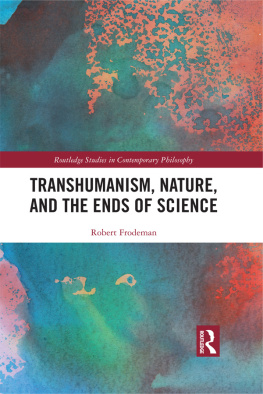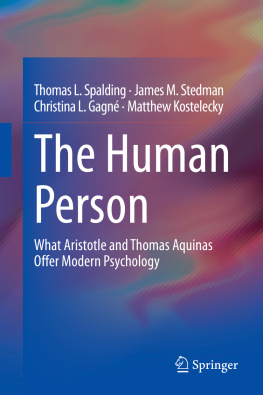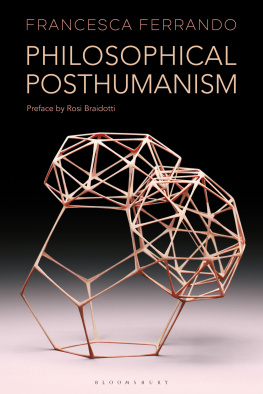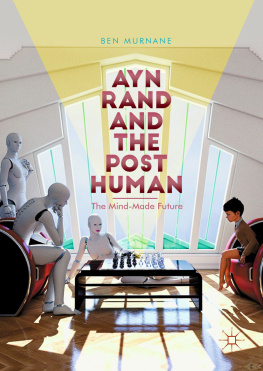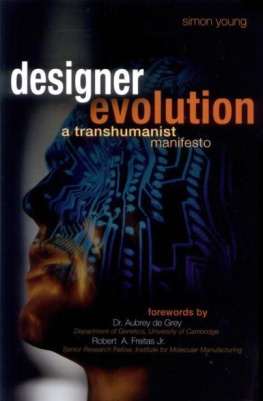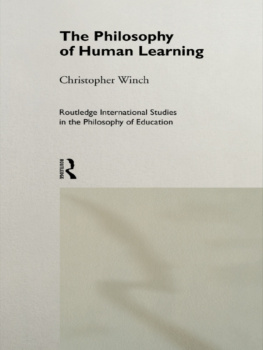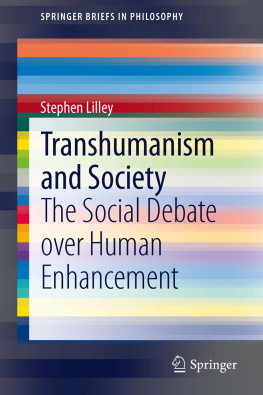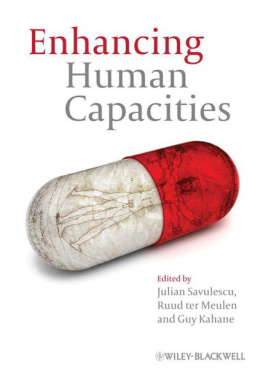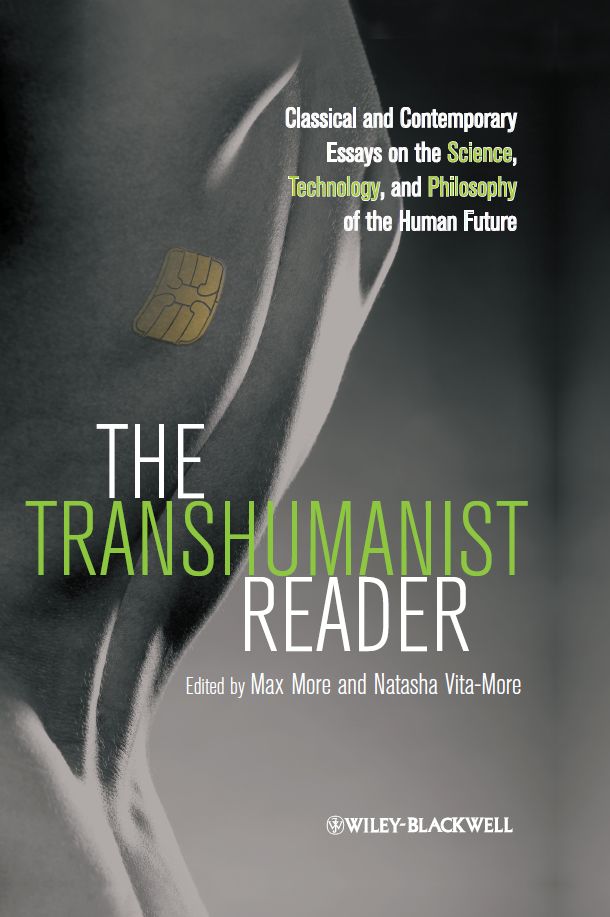
About the Editors
Max More, PhD is President and CEO of the Alcor Life Extension Foundation, the worlds leading cryonics organization. An internationally acclaimed strategic philosopher and co-founder of the first explicitly transhumanist organization, Extropy Institute, Dr. More is recognized for his thinking on the philosophical and cultural implications of emerging technologies.
Natasha Vita-More, PhD is a leading expert on human enhancement and emerging and speculative technologies and is a Professor at the University of Advancing Technology. Dr. Vita-Mores writings have appeared in Technoetic Arts:A Journal of Speculative Research, Metaverse Creativity, and Sistemi Intelligenti. She has been featured in numerous televised documentaries on media design, culture, and the future.

This edition first published 2013
2013 John Wiley & Sons, Inc
Wiley-Blackwell is an imprint of John Wiley & Sons, formed by the merger of Wileys global Scientific, Technical and Medical business with Blackwell Publishing.
Registered Office
John Wiley & Sons, Ltd, The Atrium, Southern Gate, Chichester, West Sussex, PO19 8SQ, UK
Editorial Offices
350 Main Street, Malden, MA 02148-5020, USA
9600 Garsington Road, Oxford, OX4 2DQ, UK
The Atrium, Southern Gate, Chichester, West Sussex, PO19 8SQ, UK
For details of our global editorial offices, for customer services, and for information about how to apply for permission to reuse the copyright material in this book please see our website at www.wiley.com/wiley-blackwell .
The right of Max More and Natasha Vita-More to be identified as the authors of the editorial material in this work has been asserted in accordance with the UK Copyright, Designs and Patents Act 1988.
All rights reserved. No part of this publication may be reproduced, stored in a retrieval system, or transmitted, in any form or by any means, electronic, mechanical, photocopying, recording or otherwise, except as permitted by the UK Copyright, Designs and Patents Act 1988, without the prior permission of the publisher.
Wiley also publishes its books in a variety of electronic formats. Some content that appears in print may not be available in electronic books.
Designations used by companies to distinguish their products are often claimed as trademarks. All brand names and product names used in this book are trade names, service marks, trademarks or registered trademarks of their respective owners. The publisher is not associated with any product or vendor mentioned in this book. This publication is designed to provide accurate and authoritative information in regard to the subject matter covered. It is sold on the understanding that the publisher is not engaged in rendering professional services. If professional advice or other expert assistance is required, the services of a competent professional should be sought.
Library of Congress Cataloging-in-Publication Data
The transhumanist reader : classical and contemporary essays on the science, technology, and philosophy of the human future / edited by Max More and Natasha Vita-More.
pages cm
Includes bibliographical references and index.
ISBN 978-1-118-33431-7 (pbk. : alk. paper) ISBN 978-1-118-33429-4 (cloth : alk. paper)
1. Medical technologySocial aspects. 2. HumanismHistory. 3. Human body (Philosophy)History.
4. Genetic engineeringSocial aspects. I. More, Max, 1964 II. Vita-More, Natasha, 1950
R855.3.T73 2013
610.285dc23
2012050378
A catalogue record for this book is available from the British Library.
Cover designer: www.simonlevyassociates.co.uk
Cover images: Main image Edvard March/Corbis. Chip Aldis Kotlers / Shutterstock
Contributor Biographies
Rachel Armstrong, MD, is a Teaching Fellow, the Bartlett School of Architecture, and a TED Global Fellow. She authored Living Architecture (TED Books, 2012); and co-authored with Neill Spiller Protocell Architecture: Architectural Design (Wiley-Blackwell, 2011).
Roy Ascott, is President, Planetary Collegium, Visiting Professor, School of the Arts, University of California Los Angeles. He authored Behaviourist Art and the Cybernetic Vision (Cybernetica: Journal of the International Association for Cybernetics, 1964); and co-authored with Edward A. Shanken Telematic Embrace: Visionary Theories of Art, Technology, and Consciousness (University of California Press, 2007).
Ronald Bailey, is Science Correspondent, Reason Magazine, and University Lecturer, Harvard University. He authored Liberation Biology: The Scientific and Moral Case for the Biotech Revolution (Prometheus Books, 2005); and Ecoscam: The False Prophets of Ecological Apocalypse (St. Martins Press, 1994).
William Sims Bainbridge, PhD, is Co-Director, Human-Centered Computing, at the National Science Foundation. He authored The Warcraft Civilization: Social Science in a Virtual World (MIT Press, 2010); Nanotechnology: Societal Implications (Springer, 2007); and co-edited with Mihail C. Roco Converging Technologies for Improving Human Performance (Kluwer Academic Publishers, 2010).
Laura Beloff, PhD, is Associate Professor, IT University of Copenhagen and a Visiting Lecturer, Aalto University, Helsinki, Finland. She authored Shared Motifs: Body Attachments in RL; and SL (Metaverse Creativity 1, 2011), and Wearable Artifacts as Research Vehicles (Technoetic Arts: A Journal of Speculative Research 8.1, 2010).
Russell Blackford, PhD, is Editor-in-Chief, Journal of Evolution & Technology. He authored Freedom of Religion and the Secular State (Wiley-Blackwell, 2012) and An Evil Hour (I Books, 2003); and co-authored with Van Ikin and Sean McMullen Strange Constellations: A History of Australian Science Fiction (Praeger, 1999).
Nick Bostrom, PhD, is Director, Future of Humanity Institute, Oxford University. He has written numerous papers and authored Anthropic Bias (Routledge, 2010); and co-edited with Julian Savulescu Human Enhancement (Oxford University Press, 2011) and Global Catastrophic Risks with Milan Cirkovic (Oxford University Press, 2011).
David Brin, PhD, authored Existence (Tor Books, 2012); The Transparent Society: Will Technology Force Us to Choose Between Privacy and Freedom? (Basic Books, 1999); The Postman (Bantam Spectra, 1997); and Future of Surveillance, in Changing Minds (Penguin Academics Series, 2009).
Damien Broderick, PhD, is Senior Fellow, School of Culture and Communication, University of Melbourne. He authored The Spike: How Our Lives Are Being Transformed by Rapidly Advancing Technologies (Tor, 2002); co-authored with Paul di Fillippo and David Pringle Science Fiction: The 101 Best Novels 19852010 (Nonstop, 2012); and co-authored with Barbara Lamar Post Mortal Syndrome (Wildside, 2011).
Alexander Sasha Chislenko (19592000) MS, was an AI theorist, former Researcher Society of Mind Group, MIT. He authored Technology as Extension of Human Functional Architecture, delivered at Extro3 Conference 1999, and Intelligent Information Filters and Enhanced Reality (1997). Many of his essays can be found at http://www.lucifer.com/~Sasha/ .
Andy Clark, PhD, is Professor and Chair in Logic and Metaphysics, University of Edinburgh. He authored
Next page

